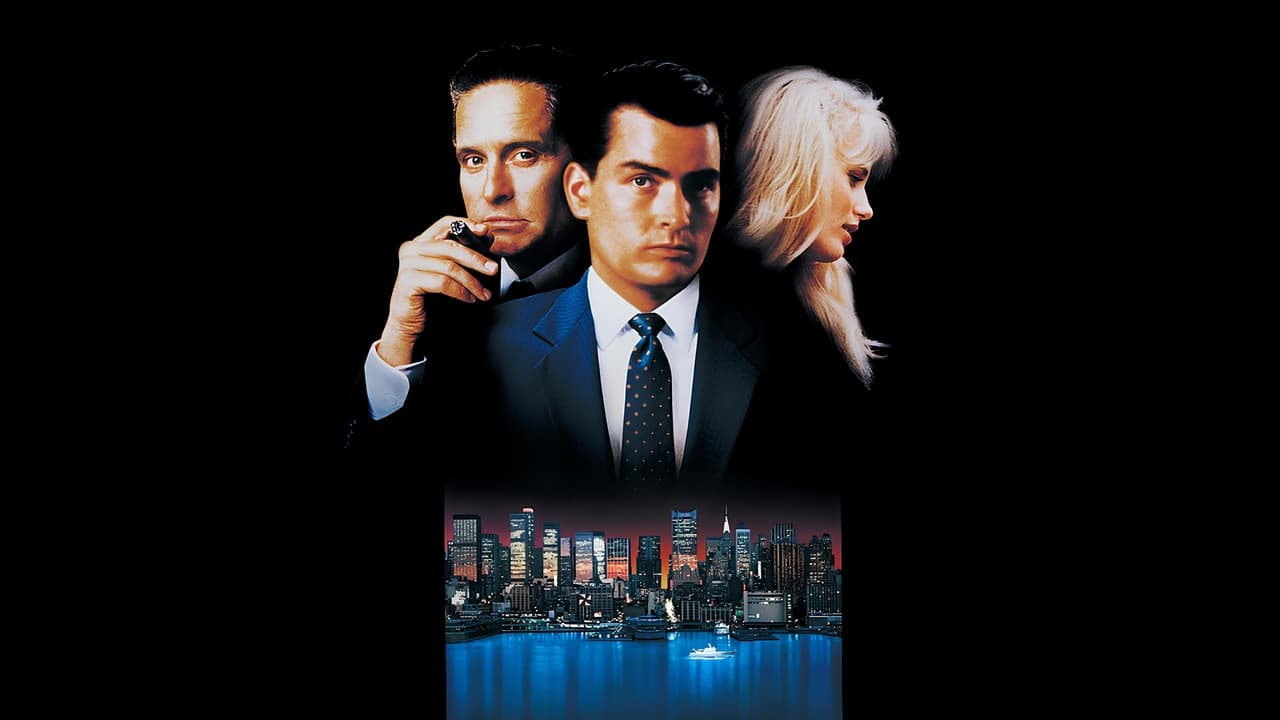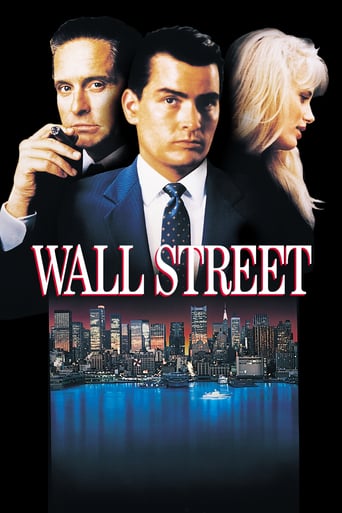LastingAware
The greatest movie ever!
Spoonatects
Am i the only one who thinks........Average?
Curapedi
I cannot think of one single thing that I would change about this film. The acting is incomparable, the directing deft, and the writing poignantly brilliant.
Janae Milner
Easily the biggest piece of Right wing non sense propaganda I ever saw.
Mr-Fusion
You can't bring up "Wall Street" without mentioning Michael Douglas. The man owns this movie. His "greed is good" speech is iconic because it's so alluring. You've got this despicable corporate raider yapping about survival of the fittest, but oozing charisma throughout. And he takes Charlie Sheen to school in every one of their scenes. He is a thrill to watch. The whole movie has that same level of appeal, which makes for some staggering replay value. Sure, subtlety isn't the movie's strong suit, but then again, you pretty much know that early on. This is a story that's easy to get sucked into. Even the dialogue is seductive (trading jargon comes at you pretty fast, but still manages to make sense - which says a lot, seeing as I don't have a head for finance or stocks).For me, this movie is purely a time capsule; the phones, the look, the feel. It just seems to transport you to a certain 1987 that feels manufactured, but also somehow authentic. There's the sense that this is the world you'd inhabit if you'd just traveled in Gordon Gekko's circles. And it's got its finger on the pulse of the decade's excess, so it feels totally real. In short, this is a pure, uncut '80s movie. And I love everything about it. Copeland's unconventional score, the brilliant casting of Martin Sheen as Charlie's dad (Martin elevates almost every movie he's in) and the easy watchability of the whole thing. 10/10
S Kerk
You might think Charlie Sheen and Michael Douglas are the stars of "Wall Street." But Gekko is just a lizard, cold-blooded. A lizard is low, stays low, and gets even lower. If he wants to try to fly to the cold, cold moon, let him. It would be a good place for him. He doesn't have a goal: he already reached it. He's like a cat playing with a mouse he already killed to see if he can get it to move. In one brief moment Gekko catches sight of the rising sun, and it stirs him more than any artwork he could buy. But that sun was shrouded in clouds, indistinct, blurry—not enough to warm his blood. Like a vampire he cannot take the light for long. Even his exercise is in a windowless hardball court. His office is as spacious as a house, but there is no joy in it. He's dead. Notice, at lunch, he doesn't even eat; he doesn't have to. He runs as a machine and by machines–one keeps constant his blood pressure. His days are formulaic: pick one winner a day out of 100 presented to him. He's all numbers: inhuman. He might as well be a chart. He has a wife, but she is strangled by possessions, with thirty strands of silver round her neck rather than one. And who could stand their kid: He's just a possession. When he whimpers like a normal kid whimpers he gets sent to a nursemaid: get him outta here. Gekko's cold hardness is the atmosphere,echoed in the skyscrapers. Unregulated capitalism has run amok. Industry, once industriousness, is now run by greed and abstractions. Nobody makes anything but money. The premise is: we cannot be someone we are not. You cannot get away from your roots or you die. We are anchored where we come from; only then can we blossom from a bud. Sheen's name is Bud —he has not grown up yet, but he will. Gekko has no past—we do not even know where he is from. He remains true to those roots: he was and is nothing. He had "an ethical bypass at birth." He is an unchanging constant. The plot concerns the fates of the two contenders who dance upon the ground of that premise: father and son. Son wants to blossom, father wants to pass along the wisdom of the warm blooded Owl, the name of the bar. Foxes are warm blooded. Gekko is cold, like steel. Bud wants to flower; in the end he does. He flowers into a man who takes responsibility for his actions. By turning state's evidence, he does his part to bring humans back to earth, not figments of imagination who think they can fly to the moon. Bud got caught in the fever of unrestricted financial bounty, and he thought he wanted to flower into a money maker. When we saw him with a warm blooded girlfriend in the beginning, he moved right away from her nakedness to his computer screen to gaze at numbers. He wanted to go up and up and up—as up go elevators in high rises, crushing people. His work buddy said, "She has a pulse, doesn't she?" Bud joked back, "Don't bet on it." Look into the mirror, Bud: you didn't either. He made better love to Fortune Magazine. Plot point #1: Bud takes the bait of the devil. Sell your soul, become inhuman, like me. Bud looks back into the limousine and says, "Deal." The Fox was trapped by the smell of numbers. Act II is a long sandy stretch of how the rich folks, Bud a misplaced flower among them, do anything for and with money—but it's not nourishing. With trophy girlfriend Darian he cooks a meal in their opulent coop, but it's a meal too perfect to eat—and they say so. This life does not nourish. Nothing satisfies these cravings. Darian says she wants "the best of everything." "Why stop at that?" he asks. "I don't." She likes her little bud, but not enough to stop two-timing him with the lizard. The opulence suffocates the bud: after making love, he goes to the window as if to try to breathe. You can't be who you are not—you can't be a man who eats spaghetti and calls it pasta. It's spaghetti. He does not yet know that he's run by that natural law that states you have to be who you are, but that's the sneaky way natural laws operates: it operates despite our ignorance. What he really wants is to grow up and be recognized as an adult. Unlike a real father, the lizard coaches him to be ruthless, illegal, and cold: to participate with whores thinly disguised as women, to buy expensive suits to make him seem to be what he is not. To die. At plot point #2 he discovers Gekko's plan to liquidate Blue Star Airlines. He'd have to go against his flesh and blood. Of the father, Gekko says. "He'll never have to work another day in his life." But Carl Fox lives to work. With the option of fully uprooting himself and his father, Bud awakens from the stupor of money. Dignity was, in the final analysis, passed from father to son. Now we see Bud leaning against a tree in Wall Street. A tree! A tree amidst all the concrete! He returns home to sit on the floor, get grounded, and eat pizza from a box. He's back down to his roots. Out goes the girlfriend, buh bye goes the lofty apartment, and bud is ready to blossom. The tape to his chest is his umbilical cord; he tears it off when his birthing is done. The prison cell, a temporary womb, will spawn him into a new being, a human one. A father raised a son. He blossomed in the park.They both got what they wanted.
Sankari_Suomi
Charlie Sheen stars in this brutal 'coming of age' movie with a Freudian twist. Minor roles are played by Martin Sheen and Daryl Hannah.Michael Douglas (in a role better suited to Ben Affleck) makes an occasional appearance as 'Guy with Abnormally Large Phone' (I'll leave you to join the psychosexual dots on that one).Sheen Jr provides an angsty performance as the young man struggling with an unresolved Oedipal complex. Sheen Sr is excellent as the rough, gruff union geezer who loves Sheen Jr so deeply that he almost treats him like a son (z0mg art imitating life!) Hannah is utterly forgettable as the irrelevant blonde bimbo. Douglas plays some random guy that Sheen Jr knows from work.Dramatic tension is provided by the filial tension between Sheen Jr and the two father figures striving for his love (Douglas and Sheen Sr). Hannah's character tries to seduce him away, but he ultimately rejects her heterosexual advances and retreats into androgyny.The climactic showdown between Sheen Jr and Douglas is replete with Freudian symbolism. I found it very moving.I rate 'Wall Street' at 26.64 on the Haglee Scale, which works out as a solid 8/10 on IMDb.
david-sarkies
Normally I would write a commentary on a movie within a few days of seeing it, however I have made an exception to this film because I really don't want to go through the bother of trying to find it again, and then sitting through two hours that the film takes to reach its conclusion. It is not that it is a bad movie, but rather it is a movie that I am not really all that interested in watching again. The only reason that I ended up watching this movie again (I have seen it twice now) was because I wanted to watch it before watching the sequel.We all know what this movie is about, and in fact this movie ended up creating a culture on Wall Street, with the style of shirt that Gordon Gecko wears being called a Gecko, and the phrase 'Greed is good' being bandied about. What is generally forgotten though is that the actual phrase is 'for lack of a better word, greed is good'. Rather surprising coming from a film whose intention is to actually criticise the casino culture of Wall Street, and the fact that people are stepping over the boundaries of illegality for the sack of greed. I guess though that the Wall Street millionaires that ended up watching this film probably did not see their actions actually being illegal (even though, like Gordon Gecko, they were practising insider trading and asset stripping companies – acts which in the end put Gordon Gecko behind bars).Unlike the sequel, which was made in response to the Global Financial Crisis, the original was made during one of Wall Street's hey days, when the market was going up and many people believed that the sky was the limit. However within a year the entire edifice would end up coming under strain when the Savings and Loans scandal hit and caused a stockmarket crash, followed by a recession, in America. Still, nobody learnt from their mistakes, and even before the crash on 08, there were a number of other crashes (and recessions) that preceded it.The other problem with films criticising Wall Street is, as I said, the Wall Street bankers generally do not take much notice of it, and those who do, generally do not have much influence to actually do anything about it. On the other hand those of us plebs who watch this film are reminded that those people in their ivory towers may be living the good life, but it does not last forever, and sometimes, having a clear conscience, is much better than having more money that you know what to do with.

